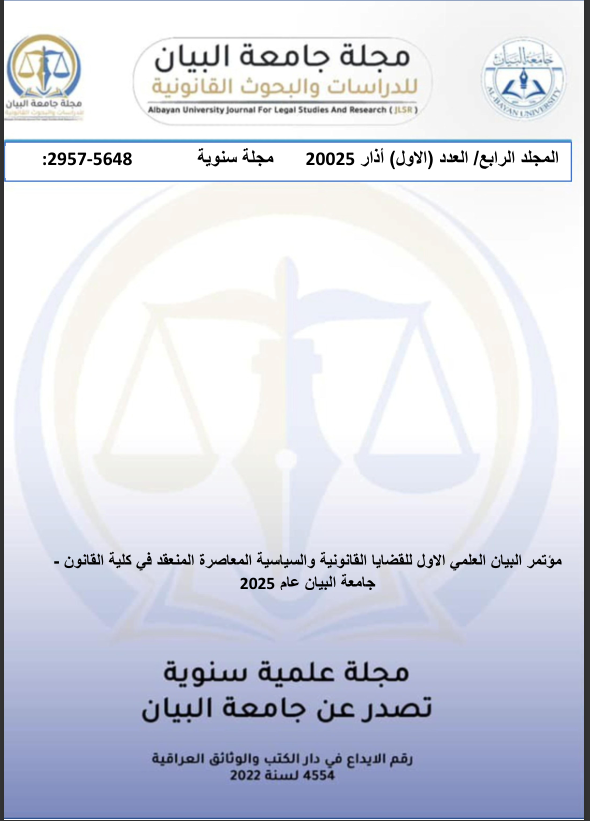The Role of Liquidity Providers in the Capital Market
DOI:
https://doi.org/10.65263/pssxjy46Keywords:
Financial markets, securities, liquidity, economic legislationAbstract
Financial markets have developed rapidly in various countries of the world, and the volume of trade in them has increased and the number of participants has increased, whether at the level of investors or at the level of activities operating within the capital market. As a result, the legal regulation of work in these markets has become an obligation to enter new horizons represented by setting controls and familiarity with all the data that achieve public and private benefit and ensure the smooth running of these markets.
These markets are one of the most important parts of the economic system of the state. If the capital markets within the state have major economic powers, the state is economically advanced, and vice versa if the capital markets are weak, the state is backward.
The stock exchange, which is one of the most important components of the capital market, is one of the most important indicators of measuring the size of a state's economy, and represents the lead in the field of economic progress and prosperity and plays a vital role in it. The stock exchange is one of the most important motivations for countries to formulate economic legislation that contributes to motivating institutions and individuals to collect their savings and attract investment in a safe manner, as it provides the necessary liquidity to drive the process of developing the economy and converting savings into an investment process. Therefore, legislative bodies, regardless of their legal positions, are working to improve the functions of the capital market and strengthen the legal framework in principle to provide support and protection. The liquidity provider system is one of the systems operating in the capital market in the stock exchange in our current era, especially after the many financial crises surrounding us, the latest of which is the outbreak of the Corona crisis (Covid-19), which affected the global economy in general and in particular on companies operating in the stock exchange as a result of weak liquidity on the one hand and investors’ fears on the other hand. The liquidity provider system came to address this, which was adopted by some legislations such as the UAE law and other legislations that adopted it, but did not make it independent of the market maker, while we find that Iraqi legislation did not adopt this system, but rather adopted other similar systems that could be adapted to their rules, and this system could be adopted in Iraqi legislation.
References
First: Books
1. Dr. Azhari Al-Tayeb Al-Faki Ahmed, Capital Markets, Dar Al-Janan for Publishing and Distribution, 1st ed., Jordan, 2017.
Second: Laws
1. The Iraqi Stock Market Interim Law, Order No. 74 of 2004
2. The Egyptian Capital Market Law No. (95) of 1992
3. The UAE Companies Law for the Establishment of Commercial Companies No. (2) of 2015
Third: Theses and Dissertations
1. Ibrahim Abdullah Al-Dahrawi, The Legal Regulation of the Financial Market Industry, PhD thesis submitted to the Faculty of Law Council, Tanta University, 2022.
2. Muhannad Hashim Al-Araji, The Legal Status of the Stock Market Maker, Master's Thesis submitted to the Faculty of Law Council, University of Babylon, 2021.
3. Medhat Hassan Nasr Hassan Abu Al-Dhahab, The Role of Market Makers in Reducing Stock Market Volatility in Egypt, Master's Thesis submitted to the Faculty of Commerce Council, Zagazig University, 2010.
Fourth: Research and Articles
1. The Impact Liquidity on the Performance of Common Stock Portfolios (An Empirical Study in the Iraq Stock Exchange), a study published in the Al-Qadisiyah Journal of Administrative and Economic Sciences, Volume 17, Issue 3, 2015.
2. Samira Latrash, The Relationship Between Liquidity and Capital Market Efficiency, a study published in the Journal of Humanities, Volume 1, Issue 32, 2009.
3. Omar Natiq Yahya, The Legal Status of the Custodian in the Stock Market, a study published in the Maysan Journal of Academic Studies, Issue 41, 2021.
4. Dr. Farid Kurtal and Kamal Raziq, The Financial Crisis (Its Concept, Causes, and Implications for Arab Countries), an article published in the Journal of the College of Economic Sciences, Baghdad University, Issue 20-A, undated.
5. Murad Mahmoud Al-Mawajdeh, The Work of Market Makers in Financial Markets (A Study in Emirati Legislation), a study published in the University of Sharjah Journal of Legal Sciences, Volume 17, Issue 1, 2020.
6. Dr. Madani Ahmed, "Towards a Model for a Market Maker System for Arab Stock Markets and the Requirements for its Implementation in Light of Global Experiences," a study published in the Academic Journal of Social and Human Studies, Issue 15, 2016.
Downloads
Published
Issue
Section
License
The authors retain Full copyright of their published article
Al-Bayan University Journal for Legal Studies and Research (AUJLSR) applies the Creative Commons Attribution 4.0 International (CC BY 4.0) License to articles and other works we publish. If you submit your paper for publication by AUJLSR, you agree to have the CC BY 4.0 license applied to your work.
Articles can be read and shared for under the following conditions:
BY: Attribution must be given to the original source (Attribution)
Full details available at
https://creativecommons.org/licenses/by/4.0/



